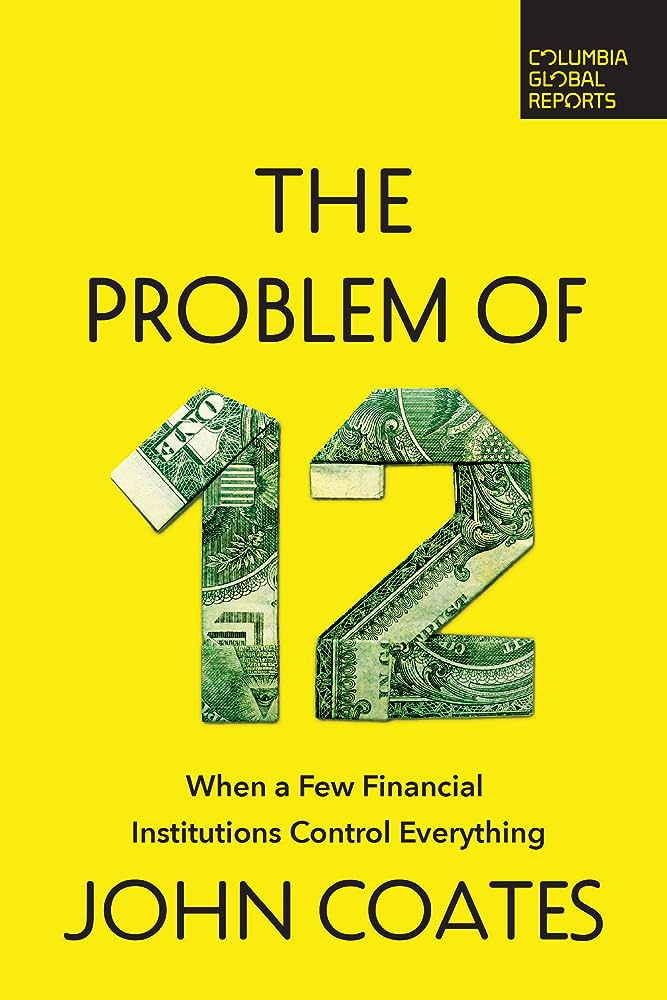When Gordon Gekko, the fictional protagonist in the 1987 Oliver Stone film “Wall Street,” uttered the infamous phrase, “Greed, for lack of a better word, is good,” he seemed to epitomize an age of unrestrained capitalism, marked by leveraged buyouts in which a few got richer while many more grew poorer. More than three decades later, the alarm bells are ringing again.
According to Harvard Law Professor John Coates, an expert in corporate governance and a former general counsel for the SEC, the three largest index fund providers — Blackrock, State Street and Vanguard — “now control more than 20 percent of the votes on the S&P 500.” At the same time, he says, private equity firms, or buyout firms as they were known before rebranding in the 1990’s, have grown so quickly that they now manage more than $12 trillion in U.S. assets.
In his new book, “The Problem of Twelve: When a Few Financial Institutions Control Everything,” Coates argues that this remarkable concentration of wealth and power in a few hands poses a threat to American democracy and has already begun to inspire responses from politicians that risk doing more harm than good. Harvard Law Today recently spoke to Coates about the risks, and possible responses, to the problem of twelve.

Harvard Law Today: What is the “problem of twelve”?
John Coates: There is a recurrent tension or conflict between finance on the one hand, and democracy on the other, at least American-style democracy. And that tension is showing up in a new form in the last 25 years, in two kinds of asset management companies, index funds and private equity funds. The tension is that finance commonly enjoys economies of scale, meaning the biggest finance companies do better than smaller ones. And that tends to mean concentration of market power within a given financial sector. And really big giant financial companies not only accumulate money, wealth, assets, but also political power, and then that creates the tension with democracy, because the way American democracy has always functioned, of course, is with separation of powers and checks and balances.
So, the “problem of twelve” is that currently around a dozen people running the biggest index funds and private equity funds now have strong influence over every public company in the U.S. and most of our economy. Both of them are on a pretty consistent trend towards more concentration and more growth, unless something changes. And finally, the last part of the thesis is that our political system already is starting to react to this concentration. If you think that these institutions do something that’s good as a financial matter — and I particularly think index funds are a wonderful thing for most middle-class Americans to invest through — you should worry not only about the threat that they pose to democracy, but also the threat that democracy can pose to them. Because sometimes the way the political system responds to concentrated power is to just kill the institutions or impose really strict restrictions that essentially make it hard for that financial company to keep doing the best financial work for the economy.
So, the problem of twelve really is sort of a double problem. It’s a problem that the power of these institutions could legitimately be seen to threaten the way we make policy in this country. And then the reverse, which is that the fear of that outcome can lead to some unintended consequences.
“The ‘problem of twelve’ is that currently around a dozen people running the biggest index funds and private equity funds now have strong influence over every public company in the U.S. and most of our economy.”
HLT: Can you explain what index funds and private equity are, and how they’re similar and how they’re different?
Coates: Sure. Both are asset management vehicles, meaning people with financial assets turn them over to these organizations to invest on their behalf. Index funds are an invention of the ’70s. Instead of paying funds to actually identify investments for you, they just buy all of the stocks in an index that some other provider comes up with. They do that for you with your money, in a pooled way with other people. And doing it that way, they can reduce the cost below what you could do on your own. It’s obviously counterintuitive, because you’d think that somehow you ought to be paying a professional to pick investments for you. The reason this method of investing has succeeded is because it’s really hard to predict the market, or any one company’s stock price. And because investment professionals are expensive, if you pay them a lot of fees, and they try to beat the market, but don’t, or just barely beat it, you’re ending up not doing any better than if you just bought all the companies in the market.

As I mentioned, indexing is a little bit counterintuitive and it took a long time for that industry to build enough of a track record to show that after you take account of fees, they really do perform better than most actively managed investment managers. And it’s gotten to the point now where, recently, it came out that when LeBron James got his first $300 million or so from being a great basketball star, he asked Warren Buffett for advice about how to invest it. And Warren Buffett reportedly told him to pick a low-cost index fund and just invest every month a certain amount and just keep doing that. And public reports now are that LeBron James is worth over a billion dollars, and he’s tripled his money over the last 15 years.
HLT: How about private equity?
Coates: Private equity funds are similar in that they’re managing money for other people. But they’re quite different in how they do it. Instead of buying small amounts of stock of all the companies out there for lots of people, they instead collect money, mostly from pension funds and sovereign wealth funds, large institutional investors that themselves are investing for others. And then the private equity fund takes that money and buys an entire company, typically, in what used to be called a leveraged buyout, meaning they borrow money, that’s the leverage, and they use the borrowed money plus the equity that they raise in the private equity fund to buy all the stock of that company. Then they run the company entirely as their own company for five to 10 years and then they typically then sell it. So, it’s buy, load up with debt, change management in some significant way to make it more profitable, and then eventually sell. That’s the model.
Just like index funds, private equity started in the ’70s and had a brief period of fame when they helped inspire books and movies from the corporate takeover era of the ’80s. But they really didn’t take off until the same period as index funds, roughly after 2000. Since then, they’ve grown as a matter of total assets at about the same pace as index funds, about 15% every year on average, which is much faster than the economy. As a result, private equity now has started to take over more and more of the economy. We are to the point now where one in every eight or nine workers in the entire U.S. economy works for a private equity company, whether they know it or not.
Unlike index funds, private equity funds are almost entirely unregulated. They’re not banks, so they aren’t subject to banking regulation. They’re not selling their own shares to the public the way index funds do, so they don’t get really regulated under the securities laws with any degree of strictness. And because the companies they buy are technically owned by a single owner, they don’t have to disclose anything about the companies that they purchase and run for a while and then resell. And so, the main thing to know about private equity is there is no disclosure. We just don’t really know whether they’re doing a good job. And because the public largely gets no information about what they’re doing, I think that’s in some ways an even bigger problem, if you will, from a political perspective.
“The problem of twelve really is sort of a double problem. It’s a problem that the power of these institutions could legitimately be seen to threaten the way we make policy in this country. And then the reverse, which is that the fear of that outcome can lead to some unintended consequences.”
HLT: What, if any, impact do these asset management firms and their influence on the economy have on income inequality?
Coates: Index funds have a complicated effect on inequality. On the one hand, they allow ordinary working-class Americans to more cost effectively diversify their investments for retirement and put it into the stock market in a way that would be maybe too expensive for them to do if they tried to do it in some other way. And since owning stocks, at least in our country, has typically produced higher returns than other kinds of saving, that is a source of reducing inequality, because it allows more people to get the benefit of rising capital prices. So, if you’re out of the stock market, you’re going to get left behind in the U.S. economy. On the other hand, not everyone has enough money even to use index funds. I mean, there are millions of Americans who have no investments at all. And so, in that way, index funds further intensify the spread between those who are left out entirely of the private investment part of our economy and those who are in it.
Private equity, I think, is more unambiguous because the returns are almost entirely benefiting the wealthiest — the people who run private equity funds and the executives who work for the companies that they buy, all of whom are in the top 1%. And they’re all using the private equity vehicles to get even richer; it’s become the standard way to get really rich now in America. And then on the flip side of it, the typical result after a buyout by a private equity firm is that they lay people off, and there are fewer workers that work at the company afterwards. Defenders of the industry will say — and there is some evidence to back this up — that they also add jobs, and they are able to grow some of the companies they buy more effectively than other companies that are not private equity owned. So, the overall picture is a little more complicated than the simple observation that buyouts equal layoffs. Having said that, I still think probably the net effect is negative, in part, because the U.S. has the weakest worker protections in the developed world. So, it’s easiest to lay people off. And when we do lay people off from businesses, they get the weakest protections, in the form of unemployment or other kinds of benefits, to help them find another job.
HLT: Does private equity, and the idea of this huge financial system that feels out of reach for many Americans, play a role in the rise of populism on both the left and the right, from folks like Bernie Sanders on one end to Donald Trump on the other?
Coates: I do think that. These types of funds are themselves coming under political pressure. Much of the product of the Progressive Era and the New Deal was dismantled beginning in the ’70s. We eliminated, effectively, union power. We dramatically rolled back regulation of many kinds across many different types of industries by many different types of agencies. And in the courts, antitrust litigation was dramatically cut back. Taxes were dramatically cut. We liberalized trade and dramatically continued the openness of our borders during an era of globalization.
The effect of all of that has been the increased growth of the overall economy. But it’s also meant that the winners and the losers are much more sharply divided. And as a result, income distribution and wealth distribution have dramatically split. And that, I think, has contributed to suspicion across a larger and larger part of the voting population, that whoever is setting the rules and whatever the rules are, they’re not working for them. That’s why Donald Trump, in contrast to standard Republican doctrine for decades, turned against some business preferences, such as open trade, in ways that nevertheless allowed him to totally dominate the Republican primaries in 2016 and 2020. Likewise, on the left, I think that suspicion and belief have given rise to a wide variety of often conflicting diagnoses and prescriptions about how to restore or create a new, fairer economy, one that’s going to provide benefits to more people.
I think this overall suspicion is going to mean that whenever there’s anything scandalous, indefensible, or even mildly controversial about what either index funds or private equity funds are doing is revealed to the public — or if we’re in the middle of a recession, or if the stock market is taking a downturn, or if people are feeling vulnerable for other acute reasons in that moment — they’re going to be easy targets. So, that’s the risk to the funds on the one hand.
“Simple solutions are unlikely to work and won’t be supported by both parties. In fact, as I write in the book, this is more a dilemma to be managed than solved.”
HLT: And on the other hand?
Coates: That these funds have too much concentrated power, in ways that are at odds with American-style democracy. Let me give you an example. Two years ago, index funds got three board members of Exxon thrown out of their jobs by voting for new candidates proposed by a climate-oriented activist fund. Nobody would have thought this had the slightest chance of succeeding 15 years ago. Even when it was happening, people didn’t really think it would happen.
But the problem of twelve is that a small number of people are now all it takes to convince that ExxonMobil is not doing a good job of running itself, and suddenly the board of ExxonMobil is in trouble. Here, you’ve got a direct impact on big companies through ownership by index funds. That’s a big change. That would not have been true in the past. It is true today and it shows index funds’ potential power. Index funds are influencing companies in ways that Republicans are uncomfortable with, even though this is quintessential capitalism.
And I don’t know that many Democrats are going to be so comfortable with it either, when they think it through. For example, Starbucks, this past spring, had a shareholder proposal to do an independent assessment of its approach to labor. Starbucks has been having all kinds of labor problems. And so, this was a controversial thing. Starbucks resisted, said “No, thank you. We don’t need some independent assessment.” But the shareholders in the end voted in favor of it and now Starbucks is going to probably have to do it. And it’s going to cause them more trouble with labor.
Why are shareholders joining to help labor? Well, because one of the big index funds, State Street, voted in favor of it. And it was probably the one that tipped it over the edge. But in the same vote, Vanguard and BlackRock, two of the other big index funds, voted against it. That means they’re not consistently trending left, which is what some Republican politicians have claimed. They’re doing different things in different moments.
The point, though, is that these funds are powerful, and they’re having an impact on companies in real policy battles that people care about. And in some ways, they’re having more of an impact than politicians are having. Because politicians, of course, are often at stalemate in Washington, and nothing really is changing at the legislative level. Regulation matters. So, that’s still happening.
HLT: So, to quote your book’s last chapter title, what can be done? How do we address the risks you’ve identified while keeping the benefits that these institutions, particularly index funds, provide to the economy?
Coates: Simple solutions are unlikely to work and won’t be supported by both parties. In fact, as I write in the book, this is more a dilemma to be managed than solved. If I were advising the people running these complexes, I would be thinking hard now about supporting rules for limited additional and mandatory disclosure, because disclosing more information to the public would make it easier for them to defend what they do, much of which they say is positive. The SEC could require more disclosure that would help address these funds’ legitimacy and accountability deficits. In addition to disclosure, I think fund advisers should be required to consult with investors in a structured manner, providing more information than they currently do and gathering feedback that might inform their decisions, even if that feedback isn’t binding. None of these reforms provide a solution to the problem of twelve, but they are better than doing nothing. And they are better than destroying the funds, or imposing unsustainably high costs such that they can no longer operate effectively.
On Wednesday, September 20, the Harvard Law School Library will host a book talk on “The Problem of Twelve” featuring John Coates and panelists. Learn more about the book talk on the HLS Events Calendar.
Want to stay up to date with Harvard Law Today? Sign up for our weekly newsletter.
